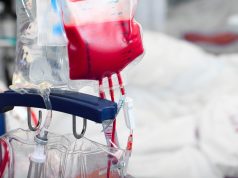Survivors who took large, daily dose of prescription-only capsules showed less decline in heart function
THURSDAY, March 5, 2015 (HealthDay News) — High doses of omega-3 fatty acids may protect against further damage in myocardial infarction patients, a preliminary study suggests. The study is to be presented March 16 at the annual meeting of the American College of Cardiology (ACC), held from March 14 to 16 in San Diego.
The research included 374 myocardial infarction survivors who received standard treatment and took either a 4-gram prescription-only dose of omega-3 fatty acids each day or a placebo. Using magnetic resonance imaging, the patients’ hearts were scanned two weeks, four weeks, and six months after their myocardial infarction.
The researchers found that, compared to those taking the placebo, patients taking the omega-3 capsules had lower levels of inflammation and were 39 percent less likely to show deterioration of heart function. There was also significantly less evidence of fibrosis. Patients with a 5 percent rise in the amount of omega-3 fatty acids in their blood seemed most likely to benefit from the supplements.
“Giving a high dose of fish oil soon after a heart attack appears to improve cardiac structure and heart functioning above and beyond the standard of care,” senior study author Raymond Kwong, M.D., M.P.H., director of cardiac magnetic resonance imaging at Brigham and Women’s Hospital in Boston, said in an ACC news release. “Because this is a unique group of patients with remarkably high adherence to [guideline-directed] treatments for acute myocardial infarction already, we feel fairly confident that the benefits from the supplement are additive. The implications of this study could be fairly large.”
GlaxoSmithKline provided the medication (Lovaza) for the study.
Copyright © 2015 HealthDay. All rights reserved.








